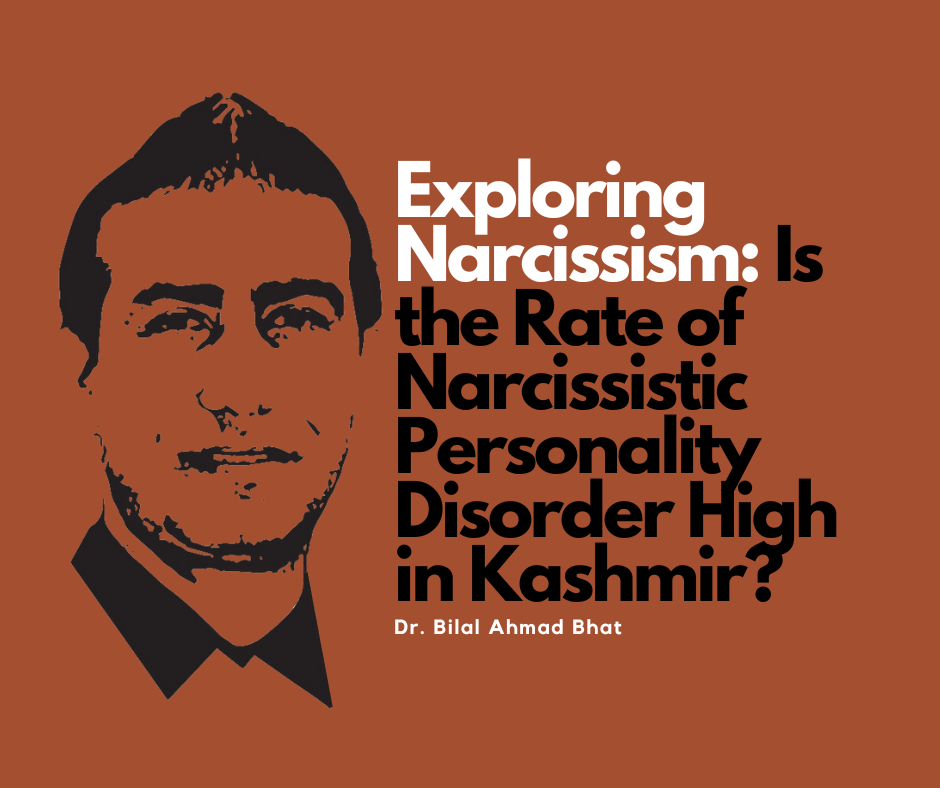In the serene valleys of Kashmir, a silent epidemic may be brewing—a rise in Narcissistic Personality Disorder (NPD). The question we must ask ourselves is: Are we adequately addressing this growing concern, or are we turning a blind eye to a serious mental health issue that affects our youth and society at large?
Understanding Narcissistic Personality Disorder
Narcissistic Personality Disorder is characterized by an inflated sense of self-importance, a deep need for excessive attention and admiration, troubled relationships, and a lack of empathy for others. While occasional narcissistic behavior can be part of normal development, especially in adolescents, NPD is a severe, long-term condition that requires attention and intervention.
The Hidden Crisis in Kashmir
Recent observations and studies suggest that the rate of NPD in Kashmir may be higher than we realize. Several factors contribute to this:
- Socio-Political Turbulence: The ongoing conflict and socio-political instability in Kashmir have created an environment of stress and uncertainty. This can lead to personality disorders as individuals struggle to cope with their realities.
- Cultural Shifts: The rapid modernization and cultural changes in Kashmir have led to a shift in values, emphasizing material success and individualism over community and empathy.
- Lack of Awareness and Resources: Mental health awareness in Kashmir is still in its nascent stages. There are limited resources and facilities for diagnosing and treating personality disorders, leading to underreporting and lack of proper care.
The Impact on Our Youth
The youth of Kashmir, who are already grappling with the pressures of education, employment, and social expectations, are particularly vulnerable. The rise in NPD among young individuals can lead to:
- Deterioration of Relationships: Narcissistic tendencies can strain family and peer relationships, leading to isolation and loneliness.
- Academic and Professional Challenges: The lack of empathy and inflated self-view can result in conflicts at educational institutions and workplaces, hampering academic and career growth.
- Mental Health Issues: NPD often coexists with other mental health problems like depression and anxiety, exacerbating the overall mental health crisis.
Why Immediate Action is Crucial
Ignoring the signs of NPD can have long-term repercussions on the social fabric of Kashmir. Here’s why we need to act now:
- Preventing a Mental Health Crisis: Early intervention can prevent the escalation of NPD into more severe mental health issues.
- Fostering Healthy Relationships: Addressing narcissism can improve interpersonal relationships, leading to a more cohesive and supportive community.
- Building a Resilient Society: A society that prioritizes mental health is better equipped to handle socio-political challenges, fostering resilience and collective well-being.
Taking Action: What Can We Do?
The need for urgent action cannot be overstated. Here’s how we can address this hidden crisis:
- Raise Awareness: Conduct awareness campaigns about NPD in schools, colleges, and communities to educate people about the signs and symptoms.
- Improve Mental Health Resources: Advocate for better mental health infrastructure, including more mental health professionals and facilities equipped to handle personality disorders.
- Promote Empathy and Community Values: Encourage cultural practices that foster empathy, community support, and emotional well-being.
- Support Groups and Counseling: Establish support groups and provide counseling services for individuals showing signs of NPD and their families.
- Policy Intervention: Work with policymakers to prioritize mental health in the socio-political agenda, ensuring that mental health care is accessible and affordable for all.
A Call to Action
The time to act is now. We must come together as a community to tackle the rising tide of Narcissistic Personality Disorder in Kashmir. This is not just about mental health; it is about safeguarding our future, ensuring that our youth grow up in an environment that values empathy, community, and mental well-being.
Let us break the silence, raise our voices, and take decisive action to address this pressing issue. The health of our society depends on it, and the time for change is now.
Join the Movement
If you or someone you know is struggling with mental health issues, don’t hesitate to seek help. Join our movement to raise awareness, advocate for better mental health resources, and support those in need. Together, we can make a difference.




